Ringworm vs eczema, both are unpleasant skin conditions, but do you know the difference between the two? Both of these conditions can cause red, itchy patches on your skin, but that’s where the similarities end.
Eczema may scab and blister, whereas ringworm may not. Here’s a closer look at the difference between ringworm and eczema, as well as how you can treat or manage both conditions.

As an Amazon Affiliate, I may get compensation on qualifying purchases.
What is Ringworm?
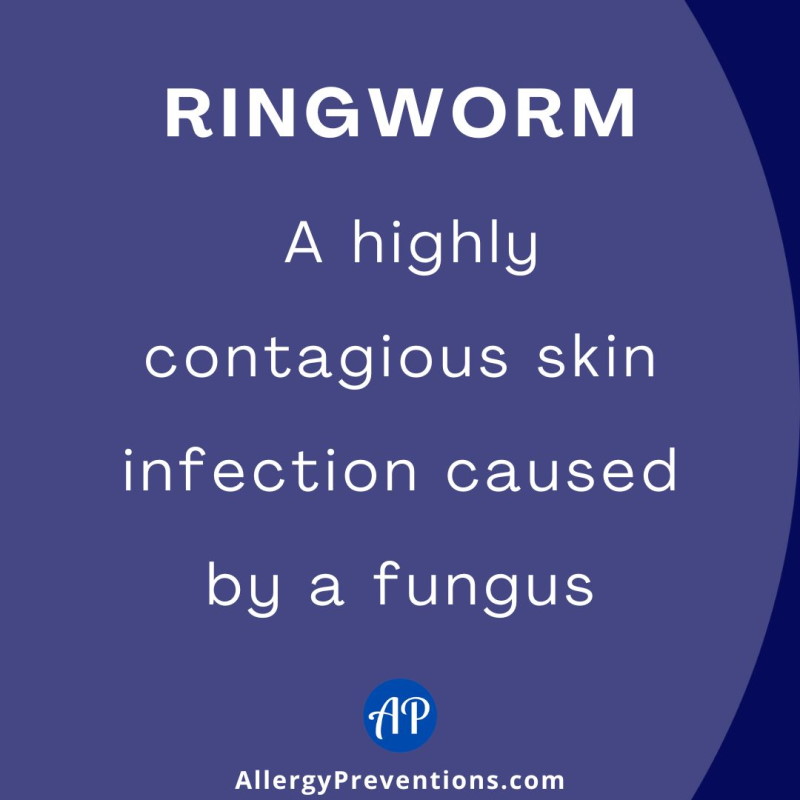
Ringworm is a skin infection that’s caused by a fungus. It gets its name (ringworm) from the fact that it often appears in a circular shape.
Ringworm is usually found on the arms, legs, or scalp, but it can appear anywhere on the body.
Ringworm is highly contagious and can be passed from person to person through contact with contaminated surfaces or skin-to-skin contact.
What is Eczema?
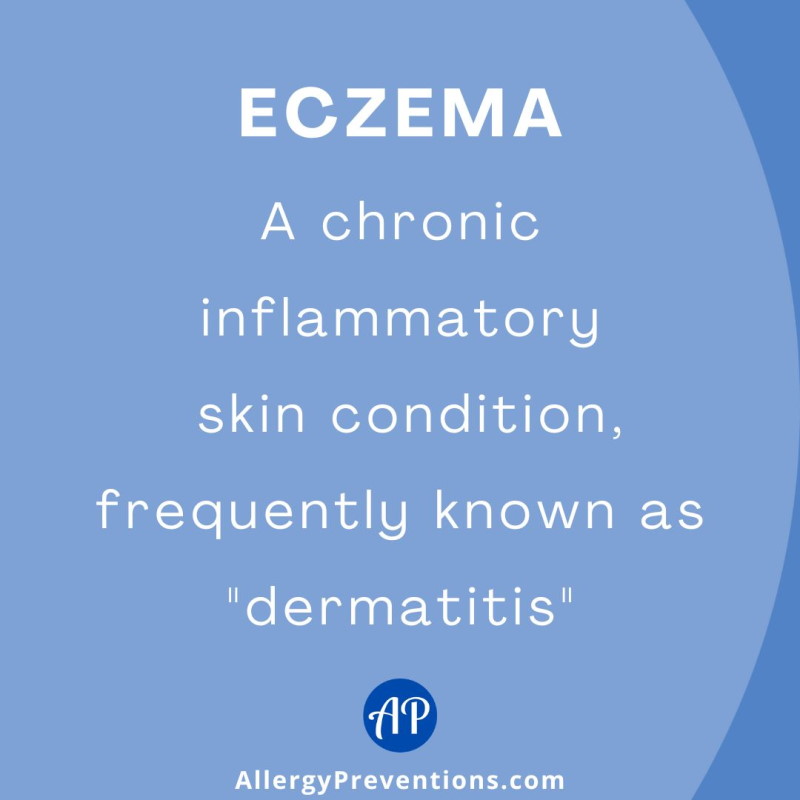
Eczema (dermatitis) is a chronic inflammatory skin condition that’s characterized by dry, itchy skin.
Eczema can be caused by several things, including genetics, allergies, and irritants.
People with eczema often have a family history of the condition. While there is no cure for eczema, it can be managed with moisturizers and corticosteroids.
How to tell the difference between ringworm and eczema
Ringworm and eczema are two skin conditions that often look similar at first glance. When comparing ringworm vs eczema, there are some key ways to tell the difference between the two conditions. Here’s what you need to know.
Location
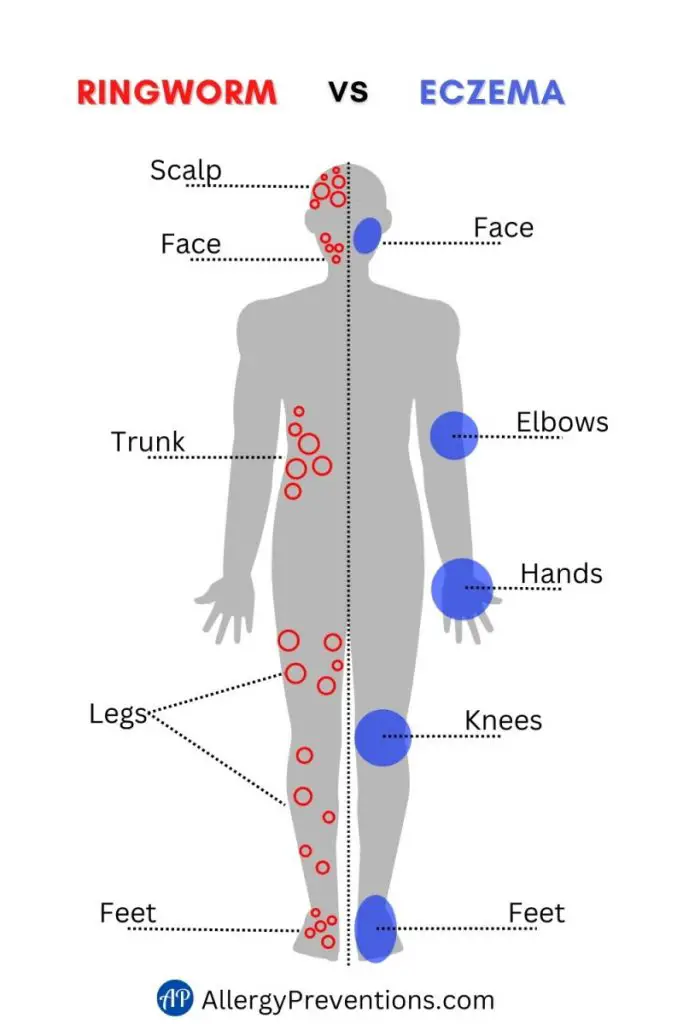
One of the easiest ways to tell the difference between ringworm and eczema is by looking at where the rash is located on the body.
Ringworm is a fungal infection that typically affects the scalp, face, trunk, legs, or feet.
On the other hand, eczema can occur anywhere on the body but is most commonly found on the face, hands, feet, elbows, or knees.
Appearance
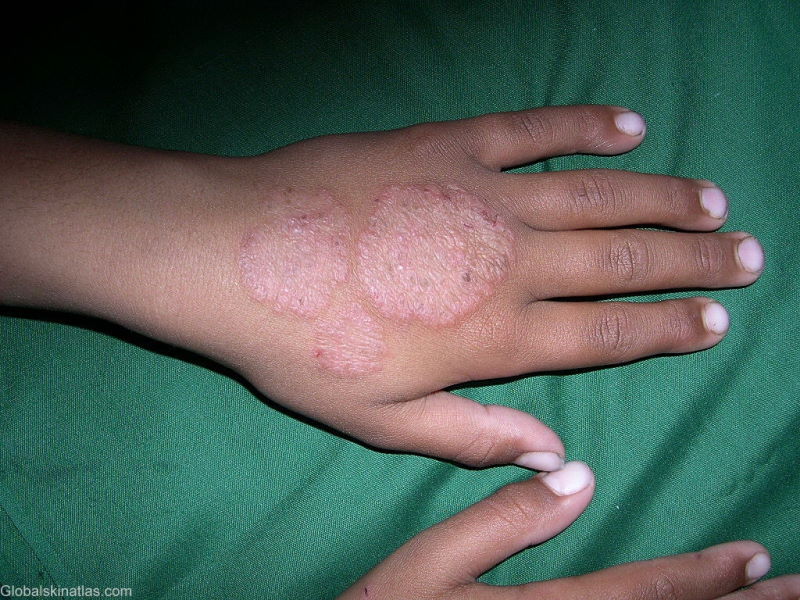
The appearance of ringworm vs eczema is different. Ringworm typically starts as a small patch of red, scaly skin that gradually expands outward in a ring-like shape.
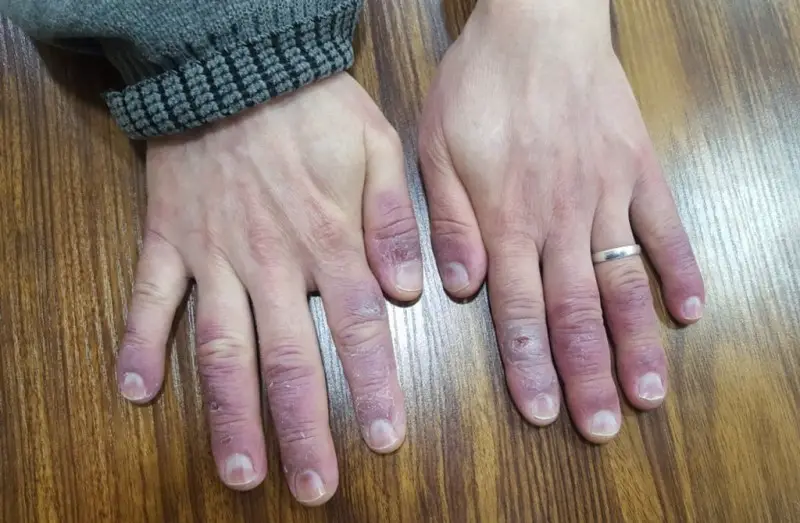
Eczema also starts as a small patch of red skin but usually doesn’t form a well-defined ring. In addition, eczema can have small blisters or bumps filled with pus, while these are not common with ringworm.
Symptoms
Another way to differentiate between ringworm vs eczema is by looking at their symptoms. Both conditions can cause itchiness, redness, and dryness.
However, eczema is also often associated with blistering, crusting, oozing, and bleeding.
In addition, people with eczema often have a burning or stinging sensation on their affected skin.
If you’re not sure which condition you have based on your symptoms, your best bet is to see a doctor for an official diagnosis.
Ringworm Treatment Options
Good news, there are treatment options for ringworm! The most common options are ointments, medications, and home remedies.
For any and all treatment options, Always consult your doctor to find the best treatment options for your specific health needs.
Antifungal Creams & Ointments
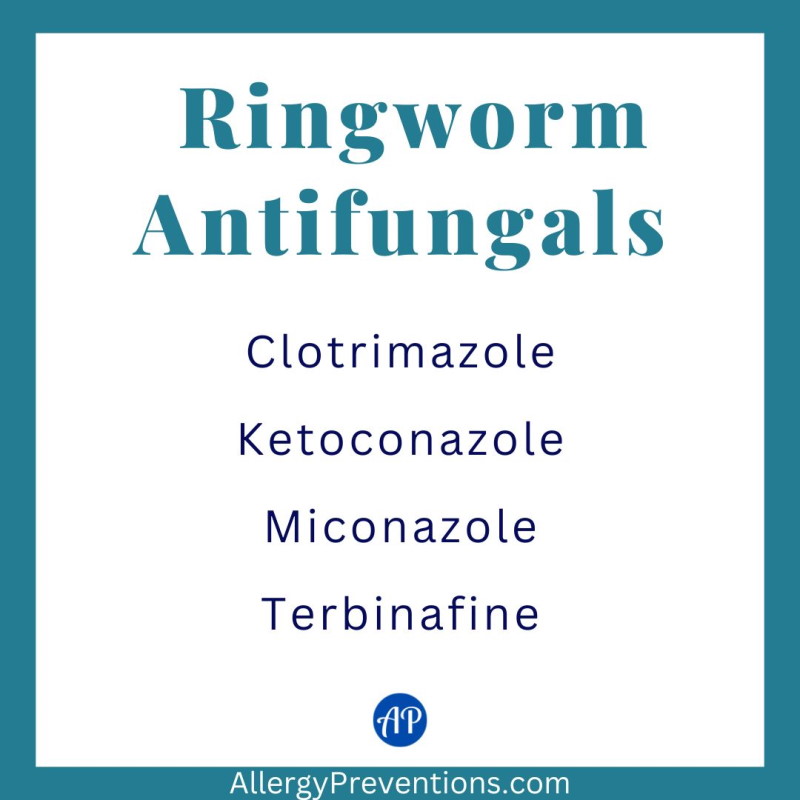
Over-the-counter antifungal creams or ointments can be effective in treating ringworm. However, it’s important to make sure you get a cream that’s specifically designed for fungal infections, as other creams may not be effective.
According to the CDC, there are 4 main types of creams for fungal infections.
- Clotrimazole
- Ketoconazole
- Miconazole
- Terbinafine
Most of these creams can be found online, which makes buying easy! Or if you need the product right away, you can always check with your local drugstore.
I researched all 4 types of creams to find the best based on product availability, health and safety of the ingredients, and reviews to find which product I would buy for myself or my family.
I chose clotrimazole as my #1 ringworm treatment choice, and here’s why.
Clotrimazole
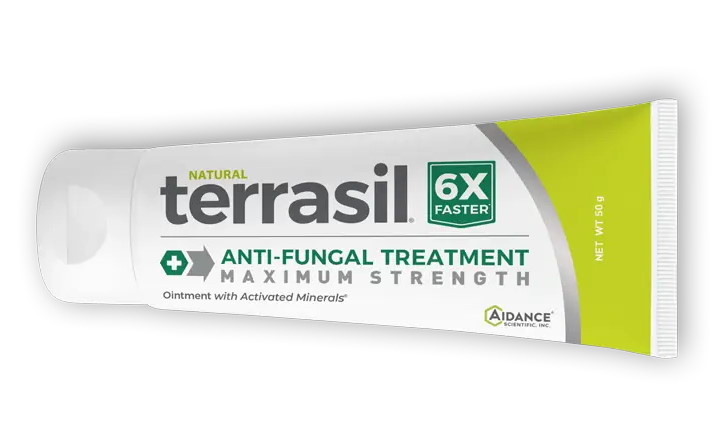
The active ingredient clotrimazole, is personally my first choice because is rated a “2” by the EWG (Environmental Health Working Group). Their scale equates to 1 is really good, and 10 is really bad.
I found that Terrasil® (which has the active ingredient clotrimazole) has an all-natural inactive ingredient list, which is really hard to find!
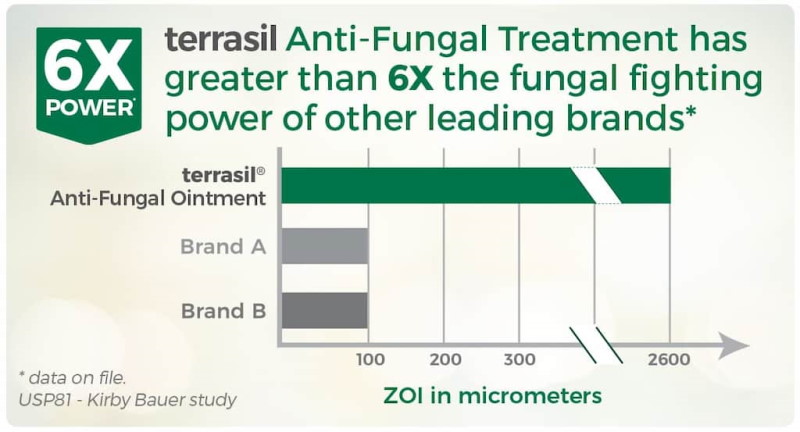
Terrasil has thousands of great reviews and can be found at local drug stores, as well as online.
The only potential downside is It is more expensive than the other ringworm treatments.
Pricing aside, the healthier ingredients, ease of availability, and countless good reviews, this is the cream I would buy today (amazon) if I had ringworm.
You might be able to find other clotrimazole creams at a lower price, just be sure to check the inactive ingredients so you know what you are signing up for.
Reasons I Did Not Pick The Other Active Ingredients
I have nothing against any of the creams, but there were reasons why they were not my first choice. My reasons were based on product availability, ingredients, health, and safety.
Terbinafine
Terbinafine is my #2 choice if clotrimazole was not available, or if I was unable to use that medication. The price is relatively low, and the product is pretty easy to find.
The only reason this was not my number one choice, is that I could not find a manufacturer that could beat the safety of the inactive ingredients of Terrasil.
Ketoconazole
This is a hard-to-find cream. Ketoconazole is mostly advertised for dog hot spot treatments, or only found in dandruff shampoos.
Additionally, this active ingredient is rated at a “6” (A 1 is good, a 10 is bad) on the EWG website for “moderate developmental and reproductive toxicity”.
Miconazole
This cream is mostly found sold as a vaginal antifungal cream (awkward application for ringworm). I did find tubes of this cream for ringworm/jock itch application, but the ingredient list had lots of ingredients, or the ingredient list simply was not available online (red flag).
Prescription Medications
If over-the-counter treatments don’t work, or your ringworm is on your scalp, the CDC recommends that you see your doctor immediately to be prescribed an antifungal medication.
Home Remedies

Several home remedies may help speed up the healing process for ringworm infections. Some popular home remedies include oil of bitter orange (OBO), and tea tree oil (TTO). Both OBO and TTO have been studied, just not in depth.
Oil of Bitter Orange

Oil of bitter orange, also known as OBO, has been shown effective in the treatment of fungal skin infections, but the controlled clinical trials are limited.
OBO is a natural remedy that’s been used for centuries to treat a variety of ailments.
It works by healing the skin and reducing inflammation. OBO is typically made from orange peels from the citrus plant Citrus Aurantium.
Tea Tree Oil
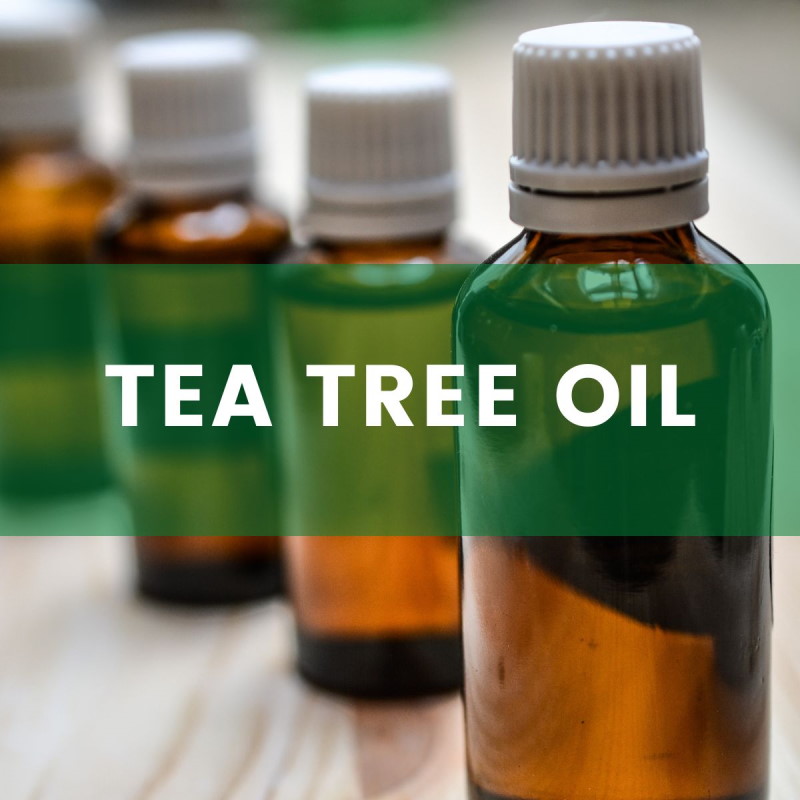
Tea tree oil (TTO) has anti-inflammatory, antimicrobial, and antiseptic properties, which make it effective in treating skin infections, acne, psoriasis, and other skin conditions.
TTO is a natural remedy that has been used for centuries to treat a variety of medical conditions. It is derived from the leaves of the tea tree, an Australian shrub.
Tea tree oil can also be used to help treat respiratory infections, such as bronchitis and sinusitis, and oral infections, such as gingivitis. Additionally, tea tree oil is a natural insect repellent.
Eczema Treatment Options
There are a few different treatment options for eczema, including ointments, medications, and home remedies. Every individual’s health needs are different, and what works for one person might not work for another.
By speaking with a medical professional, you can ensure that you’re getting the best possible care for your situation.
Antihistamines
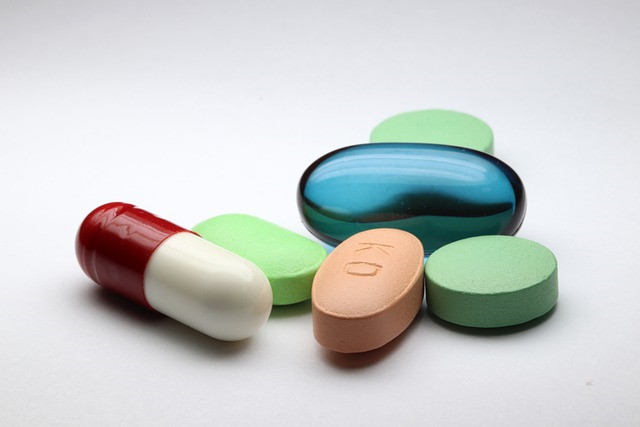
Antihistamines are not only used to treat allergies, but they can be helpful for eczema as well. They work by stopping histamine, which prompts itching, in your body. You can buy antihistamines over the counter or with a prescription.
Be sure you read and follow the directions on the package exactly, as using them too much can result in side effects. Consult your doctor before taking any medications.
Creams and Ointments
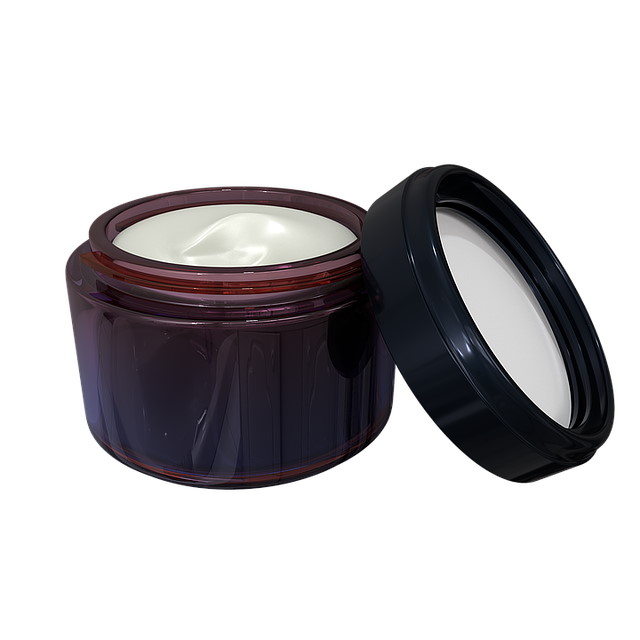
Many different over-the-counter medications can help relieve the symptoms of eczema. Some common medications include topical corticosteroids and moisturizers.
Corticosteroids
Corticosteroids are a type of medication that can help relieve the symptoms of eczema. They work by reducing inflammation and helping to heal the skin
The most popular and strongest corticosteroid that is sold over the counter is Cortizone 10, which you can find just about anywhere, including Amazon.
Moisturizers
Moisturizers help heal eczema by adding moisture to the skin. This can help reduce inflammation and make the skin less itchy.
Zincuta Skin Remedy
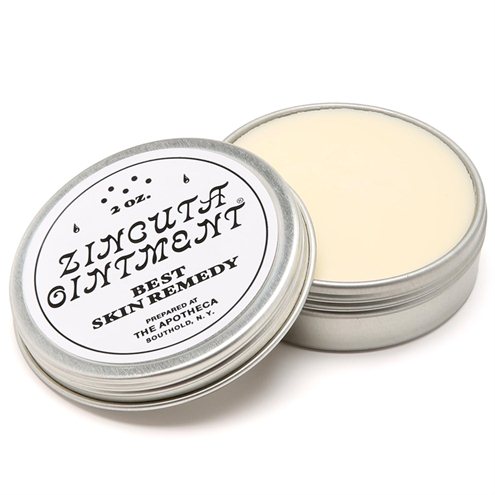
Zincuta Ointment® skin remedy is all you need for most skin healing needs (including eczema).
It’s a specialty cream that brings relief and heals skin afflictions quickly and effectively. It has antibacterial & antiseptic properties, and its coating protects the injured part while it penetrates, softens, soothes, and heals all surface skin afflictions.
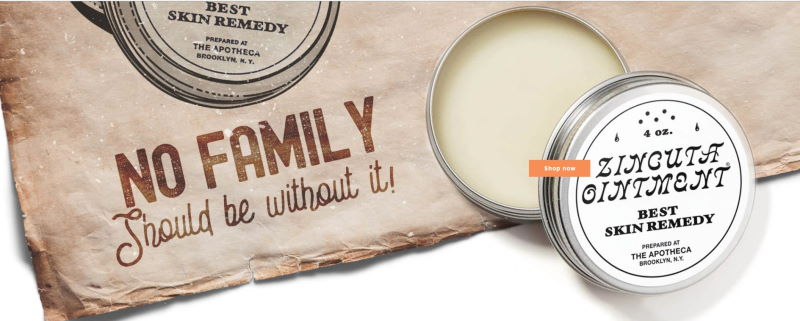
You won’t find another product on the market today that can compare to the healing power of Zincuta Ointment.
It’s made with only the highest quality natural ingredients and has been selling for 40 years.
They also have a 180-day money-back guarantee, so if you don’t like it you get a refund.
Check it out on the Zincuta Website, and if you are interested, use my 20% off AND free shipping code: “SH20”.
Prescription Medications
Sometimes over-the-counter treatments don’t work, your doctor may prescribe a stronger medication to treat your eczema.
Your doctor may recommend a higher-concentration steroid, or recommend immunosuppressant medication.
Eczema Home Remedies
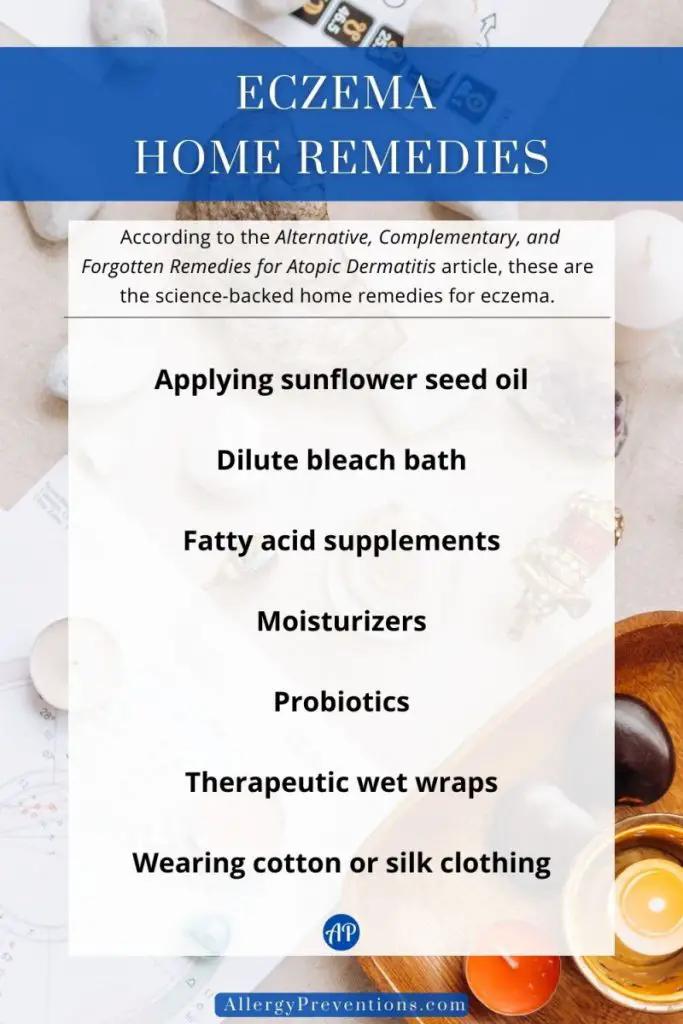
Many different home remedies can help relieve the symptoms of eczema. I found an article, Alternative, Complementary, and Forgotten Remedies for Atopic Dermatitis, which lists some great science-backed home remedies for eczema or dermatitis.
- Applying sunflower seed oil
- Dilute bleach bath
- Fatty acid supplements
- Moisturizers
- Probiotics
- Therapeutic wet wraps
- Wearing cotton or silk clothing
For even more non-prescription eczema remedies, check out How to Get Rid of Eczema Without Steroids.
Preventing Ringworm
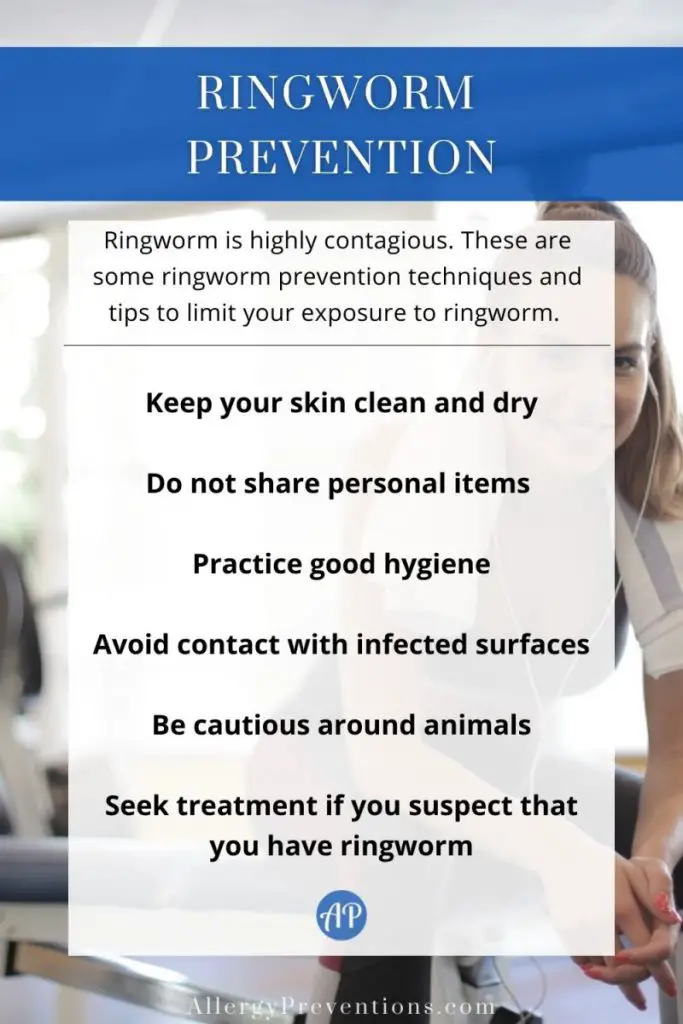
There are several ways to prevent ringworm from occurring. Remember, ringworm is spread from person to person, or from objects infected with the fungus. Following these prevention tips should go far in limiting your exposure to ringworm.
Keep Your Skin Clean and Dry
One of the best ways to prevent ringworm is to keep your skin clean and dry. Make sure you bathe or shower regularly and dry off completely after getting wet.
Don’t Share Personal Items
A great way to prevent ringworm is by not sharing personal items, such as clothes, towels, or hair brushes.
Practice Good Hygiene
Washing your hands frequently and keeping your nails trimmed can help reduce your risk of developing ringworm. Also, wear shower shoes in showers and locker rooms.
Avoid Contact With Potentially Infected Surfaces
Ringworm can hang out on many surfaces, and love moist environments. These are the most common places ringworm is found.
- Gyms
- Locker rooms
- Pools
- Public Showers
- Wrestling mats
Animals

Yes, animals can spread ringworm. According to the CDC, animals can become infected with ringworm just as humans can. The biggest culprits are puppies and kittens, but farm animals can transmit ringworm as well.
If you suspect your animals are infected with ringworm, contact your veterinarian for treatment options.
Seek Treatment If You Think You Have Ringworm
If you believe you have contracted ringworm, it is imperative that you seek medical attention as soon as possible. Without treatment, the fungus will only spread and become more severe.
What makes ringworm worse?
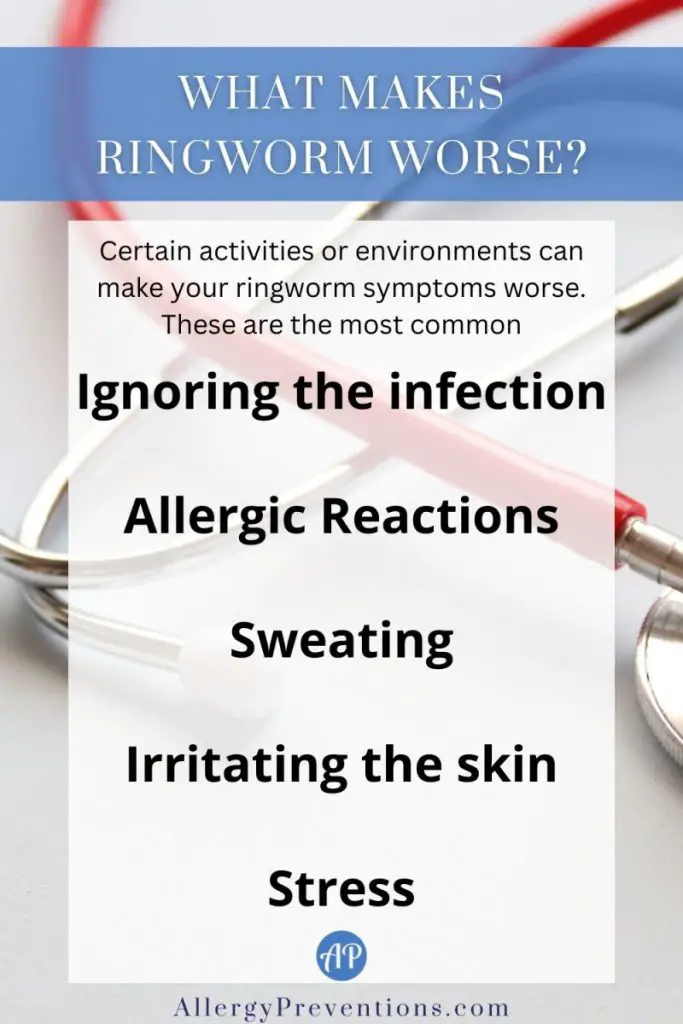
Several things can make ringworm worse. Some of the most common factors include ignoring treatment, excessive sweating, and irritated skin.
Ignoring The Infection
If you have a ringworm infection, it’s important to treat it right away. Ignoring the infection can make it more difficult to treat and can increase your risk of developing complications.
Allergic Reactions
Some people may experience an allergic reaction to the antifungal medications used to treat ringworm. This can cause symptoms such as skin irritation, burning, or itching.
Sweating
Sweat can cause the fungus that causes ringworm to spread and worsen the infection. Try these tips for preventing moisture buildup:
- Avoid wearing tight clothing or clothes made from synthetic materials like polyester
- Wear loose-fitting clothes made from natural fibers like cotton or linen
Irritated Skin
Avoid using harsh soaps or detergents on the affected area. Any unnecessary irritation to the skin cause causes your symptoms to become worse and may spread the ringworm further.
Stress
Elevated stress levels can weaken or stress your immune system over time. A stressed or weakened immune system makes you more susceptible to infections, including ringworm.
Preventing Eczema
There are a few things that you can attempt with preventing an eczema flare-up. If you know what causes your eczema flare-ups (which vary from person to person), avoid those triggers!
Hydration

Next, make sure you are keeping your skin hydrated by drinking water and using a quality moisturizer regularly. When choosing a moisturizer, look for the most natural product you can find, or at least ensure it is not heavily scented. Scented products are notorious for causing allergies and irritation on the skin.
Ditch The Chemicals
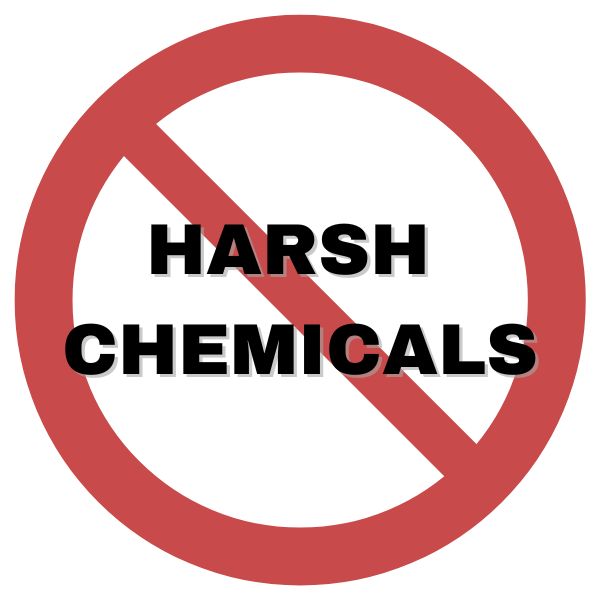
Avoiding chemicals can help prevent eczema flare-ups. Chemicals is a blanket term that covers anything that could potentially be harsh on your skin. Here are some examples of products that you may want to switch to a more natural or unscented version.
- Body washes
- Dryer sheets
- Household cleaners
- Industrial/workplace chemicals
- Laundry detergents
- Scented soaps/lotions
- Shaving creams
What makes eczema worse?
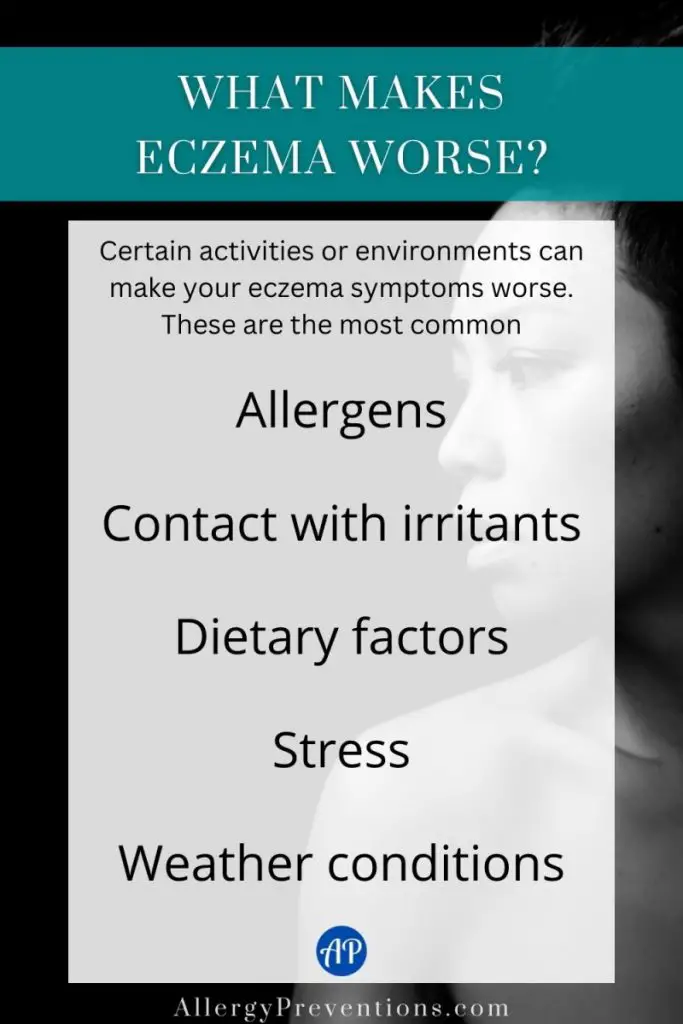
Several things can make eczema worse. Unfortunately, there are some factors that you simply cannot control, like the weather. But, being aware of what makes dermatitis worse can help you prepare in advance and lessen your eczema symptoms.
Some of the most common factors in making eczema worse include:
Allergens
Allergens, such as pollen, pet dander, and dust mites, can cause the skin to become inflamed and irritated.
Contact with Irritants
Contact with irritating substances, such as soap or detergent, can cause the skin to become red and itchy.
Dietary Factors
Some people may be allergic to certain foods, which can trigger eczema flare-ups.
Stress
Stress can weaken your immune system and make you more susceptible to infections, including eczema.
Weather Conditions
Changes in weather conditions, such as humidity and temperature, can cause the skin to become dry and itchy.
Can you have ringworm and eczema?
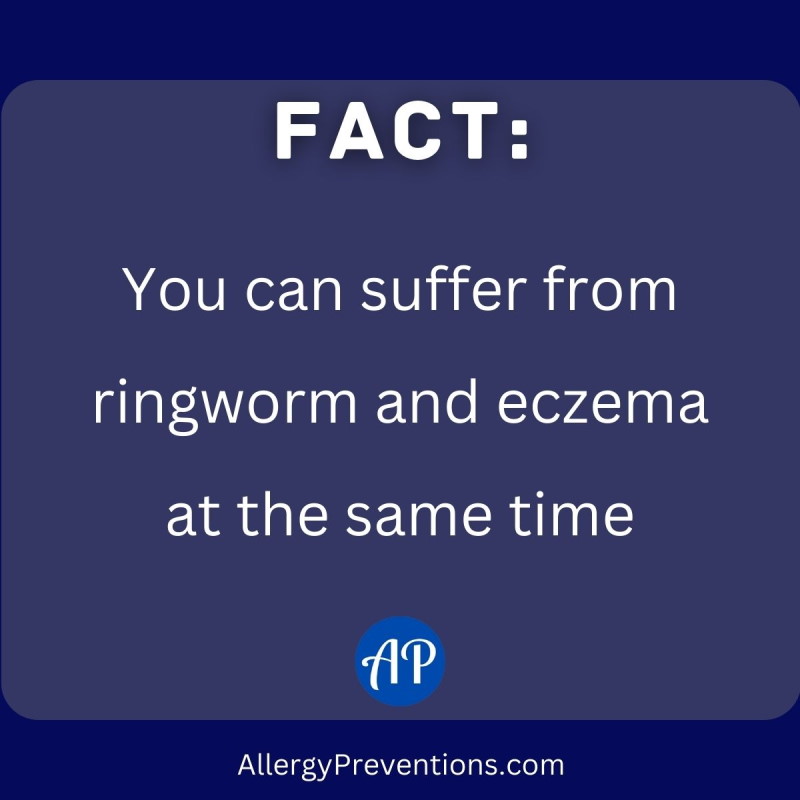
Yes, you can have ringworm and eczema. They are two different skin conditions, but they can both cause red, itchy patches of skin. If you’re not sure which condition you have, be sure to see a doctor for an official diagnosis.
FAQs
Are ringworm and eczema the same?
No, ringworm and eczema are not the same. Ringworm is a fungus caused by the fungi Trichophyton, Microsporum, and Epidermophyton.
Eczema is an inflammation of the skin and has many possible triggers. Both skin conditions can cause red, itchy patches of skin.
Can eczema cause ringworm?
No, eczema cannot cause ringworm but it can make you more susceptible to contracting ringworm.
Eczema is an inflammation of the skin that can cause dry or cracked patches. These patches make it easier for the ringworm fungi to penetrate the skin and cause ringworm infection.
Can ringworm cause eczema?
Yes, there is a link between ringworm and eczema – specifically, that having ringworm can make you more susceptible to an eczema flare-up.
Do ringworm and eczema look alike?
At first glance, maybe, but upon deeper analysis, they do not look the same. Ringworm causes a ring-shaped rash on the skin, and eczema causes patches of dry and inflamed skin (not typically ring-shaped).
Can I put fungal cream on eczema?
Yes, according to the National Eczema Society, you can put fungal cream on eczema. But, fungal cream should only be used if you do have a fungal infection with your eczema.
Should you moisturize ringworm?
No, the ringworm fungus likes damp, moist environments. If you have ringworm, you should treat it with an anti-fungal cream. Consult your doctor for all health-related questions.
Check these out next!
